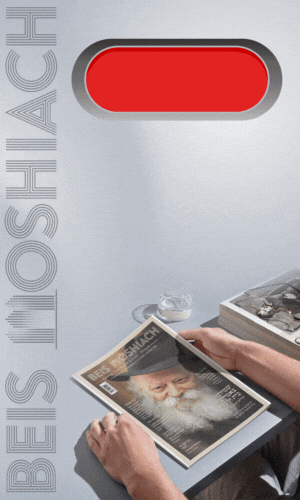A Doctors Conference At The Rebbe’s House
The story of Rabbi Zalman Gurary’s dedicated support of all the personal matters of the Rebbe & the Rebbetzin — Presented in honor of the Rebbetzin’s Yom Hilula on 22 Shevat • By Beis Moshiach Magazine • Full Article
Shneur Zalman Levin, Beis Moshiach
There was a strong relationship between Beis Rebbi and the family of R’ Shneur Zalman Gurary. It was a warm and close relationship, as if they were actual relatives.
R’ Gurary devoted himself to all matters of Beis Rebbi, large and small, especially medical matters. In return, the Rebbetzin showered R’ Zalman and his family with special and close attention.
For example, between 5744 and 5748, before the Rebbe began farbrenging every Shabbos, R’ Zalman would go to his apartment on the corner of Kingston and Union (behind 770) on those Shabbosos when the Rebbe would farbreng, to make it easier for himself since walking was hard due to his health problems.
There were Shabbosos when people did not know ahead of time whether there would be a farbrengen as there was no fixed schedule for these farbrengens. The Rebbetzin would ask the Rebbe whether there would be a farbrengen so she could tell R’ Zalman. Her goal was to prevent him from having to make the move from his regular home to the apartment on Union for no reason.
Those in the know, upon seeing R’ Zalman’s car parked for Shabbos near the house on Union, knew that there would be a farbrengen on Shabbos. However, there were times that the Rebbe would tell the Rebbetzin he hadn’t decided yet and in order not to miss out, R’ Zalman would spend Shabbos in that home.
It once happened that he did not go by car and that Shabbos, since his car wasn’t seen in that place, people thought there would not be a farbrengen but there was.
One time, the Rebbetzin told him that before a farbrengen in which the Rebbe delivered a Hadran, the Rebbe paced back and forth all night in his room and prepared the Hadran.
This special connection extended to all areas of life, as for example R’ Zalman would give letters to the Rebbetzin which he wanted to be given to the Rebbe and sometimes he would convey requests for blessings through her.
A relative was stabbed by a goy and on motzoei Shabbos, R’ Zalman called the Rebbe’s house and asked the Rebbetzin to tell the Rebbe about it. He provided the full name of the victim so the Rebbe could bless him.
The next day, when dollars were given for tzedaka, one could not miss how the Rebbe focused his gaze for a long time on the other family members that passed by as though seeking the one who had been stabbed.
***
One Sunday, for some reason, R’ Zalman did not call the Rebbetzin and did not speak with her. The Rebbetzin tried calling his house and nobody answered. The Rebbetzin called the Rebbe in 770 and said that she was worried lest something happened to R’ Zalman, for he had not contacted her. The Rebbe said, “I saw him today at dollars, I saw Esther [Sternberg, R’ Zalman’s daughter] and the grandchildren. Nobody said there was a problem.”
***
Once, R’ Zalman’s son-in-law, R’ Nachum Sternberg had a toothache. R’ Zalman called the Rebbetzin and asked for her dentist’s phone number. When she asked why he needed it, he said that his son-in-law’s tooth hurt.
A few days later, R’ Nachum had yechidus with the Rebbe. As he stood there, after the preparations a Chassid makes before having yechidus, the Rebbe asked him, “How is your tooth?”
***
“After all the events and simchos in the Gurary house,” recalled his grandson, R’ Yosef Yitzchok, “When we would bring pictures of the event to the Rebbetzin, she would regularly ask that they be left with her and she would return them the following day. It was obvious that she wanted to show them to the Rebbe.”
***
When his first great-grandson was born, Levi Slonim, the Rebbe came home and joyfully announced to the Rebbetzin, “We get a mazal tov, Rabbi Gurary became a great-grandfather!” The Rebbetzin later repeated this to R’ Zalman.
FOR THE REBBETZIN’S HEALTH
When the Rebbetzin did not feel well, even before something developed, R’ Zalman knew how to get the details out of her and respond accordingly. They would say about him that he was a doctor without a license. One time, the Rebbetzin herself said about him, “His knowledge of medicine is extraordinary.” He never merely accepted what the doctors said. He always sought to know every factor and cause, and would not rest until he could find a solution for every problem, big and small. He would speak with doctors in their language and all the professionals who came to the house had respect for him.
Said Dr. Moshe Feldman, one of the doctors in Crown Heights and one of the Rebbetzin’s doctors, “Rabbi Gurary was the address for her. He did whatever she wanted. When he called someone and said to do something, everyone obeyed him, even if they didn’t want to, for they knew that he only wanted the truth and his truth was for the benefit of the Rebbe and Rebbetzin.
“Anytime that a specialist was needed for the Rebbe or Rebbetzin, I knew that R’ Zalman would find one. He would import the biggest experts to the house of the Rebbe and Rebbetzin and paid for it and they worked in his employ.
“There were times that the Rebbetzin called me and wanted something but sometimes I was very busy. Then, R’ Zalman or his daughter were on the line in an instant and would say with utmost urgency: This is about the Rebbetzin; you must drop everything and come.
“One Friday night, the Rebbetzin was sick and R’ Zalman asked me to come to their house on President Street. I had to bring some medical equipment and I brought it in a big white bag. Because it was so large, I couldn’t put it under my coat to carry it out of sight.
“I knocked on the door and nobody answered. Bachurim were standing there whose job it was to guard the Rebbe’s house and they did not recognize me. At the time, there was tension with a certain faction who opposed the Rebbe and I became suspect. The bachurim considered me a hostile entity because of the big, strange bag I had. I had no choice but to ring the bell on Shabbos. The Rebbetzin came to the door, smiled and told the bachurim to go.”
SIGNS OF APPRECIATION
Wanting to repay R’ Zalman for all of his exertions on her behalf, the Rebbetzin would try to give him things that the Rebbe used, knowing how precious these were to him. She would also tell him things about the Rebbe that nobody knew. This was her way of expressing her appreciation to him.
Every year, the Rebbe would say “shehechiyanu” on the second day of Rosh Hashana on a white silk scarf (when there were tekios on both days). The Rebbetzin, knowing that the most precious thing to R’ Zalman was something that belonged to the Rebbe or that the Rebbe used, would bring him this scarf. He had several of these, given to him by the Rebbetzin.
The Rebbetzin would often give him leftovers (“shirayim”) from food that the Rebbe ate.
Every year on Chol Ha’Moed Pesach, she would give him some whole matzos of the Rebbe. She knew the great value he placed on the shirayim of the Rebbe, which were very dear to him, and in this way expressed her appreciation to him.
One year, the Rebbetzin gave him the Rebbe’s tallis. R’ Zalman was buried in this tallis, as written in his will.
THE REBBETZIN’S CONCERN FOR HER BROTHER-IN-LAW
At the end of 5745, when the Rebbe’s brother-in-law, Rabbi Shmaryahu Gurary (Rashag) was alone with no support or anyone to rely on, the Rebbetzin asked R’ Zalman, “My husband and I ask that just like you take responsibility for our health, that you take responsibility for Rashag too.”
R’ Zalman accepted the order on the spot and from then on, he became Rashag’s medical advocate. He hired two bachurim to attend to him all hours of the day, who were devoted to his welfare. He personally dealt with the doctors who cared for him and even went with him to the hospital whenever necessary, taking full responsibility to provide him with the best medical treatment.
From that point on, the Rebbetzin would call Rashag’s house every day and talk with the bachur on duty, questioning him and ascertaining that they were feeding Rashag appropriately. The Rebbetzin even gave the bachur her direct phone number which was unlisted, expressing her hopes that he would be, as she put it, a bar-daas and not give it out.
Aside from this, R’ Zalman would report to the Rebbetzin regularly about Rashag’s condition and regularly report to the Rebbe in writing about him.
***
The following story told by R’ Yosef Yitzchok Sternberg, R’ Zalman’s grandson, illustrates the Rebbetzin’s diplomacy and wisdom:
“The night of Shevii shel Pesach 5747, Rashag was taken to the hospital with a deterioration in his health as seen in his lack of responsiveness to his surroundings. This was due to a severe case of pneumonia that he suffered. The next day, toward evening, word arrived that his condition had improved and he was responsive. My grandfather told me to go to the library where the Rebbetzin was staying and give her the good news.
“I went to the library, knocked on the door but there was no answer. I thought the mashbak (the Chassid who served as a personal aide) would open the door and I would ask him to convey the news to the Rebbetzin, but after a few minutes, the Rebbetzin opened the door and I went in. I said to her that we had just heard that Rashag’s condition had improved and he was responsive. The Rebbetzin was very pleased and thanked me several times, with emphasis on the fact that it was for good news. ‘Indeed,’ she said, ‘I was very worried about him and I thank you for making the effort to tell me this news.’
“The following day, Acharon shel Pesach, R’ Sholom Ber Gansburg, the mashbak, censured me. ‘What did you do? Why did you go and tell the Rebbetzin? We were trying to keep it from her until after Yom Tov!’
“I was taken aback and shocked. The Rebbetzin showed no sign of surprise and made every effort to give me the best possible feeling, even though she had just been told about something she knew nothing about. I realized, to my amazement, how she had ensured that I, a young bachur, would not be put out over the fact that I was the one who who caused her anguish and reported that news to her.”
At a certain point, when the doctors were apprehensive regarding Rashag’s clarity of mind, the Rebbetzin asked the bachur on duty whether Rashag called him by name. When she was told yes, she asked, in the most sensitive way, as was her wont, “Excuse me for bothering you, what is your name?” The bachur said his name was Yosef Yitzchok. The Rebbetzin replied with a laugh, “Then it’s no proof, since you have my father’s (the Rebbe Rayatz’s) name and that is why he remembers the name.”
Rashag, who received such daily and tangible assistance in his final years, was very grateful for it. In a rare interview that he granted the Algemeiner Journal after the passing of the Rebbetzin, he burst into tears and said, “I feel like an orphan who lost his mother.”
This moving line was the headline of the interview.
FINAL WORDS
In the days before 22 Shevat 5748, the Rebbetzin was not in good health. At six o’clock Tuesday night, the eve of 22 Shevat, there was a meeting of doctors in the Rebbe’s house. Included were Dr. Moshe Feldman, Dr. Moskowitz, and Dr. Weg as well as R’ Zalman Gurary. The Rebbe came home earlier than usual in order to be present at this meeting.
In one of the diaries it says that before the meeting, the Rebbetzin said that since the doctors came after a day’s work and had not eaten supper yet, the meeting should not begin until they were served supper. And that is what happened; after they were served, the doctors sat down to a meeting.
The meeting was arranged when, the night before, Dr. Feldman was called frantically to the house because the Rebbetzin had an ulcer attack. He was firmly convinced that the Rebbetzin should be taken to the hospital but the Rebbetzin refused, and the Rebbe asked R’ Zalman to call a meeting for the doctors to offer their opinions about the Rebbetzin’s condition.
Dr. Feldman asked for R’ Zalman to be called that evening but the Rebbetzin said no, since he gave a shiur in the evening and she did not want to disturb him before the shiur.
Mrs. Sternberg said that the Rebbetzin wanted to postpone the meeting since the night before there had been a yechidus klalis for guests who came for Yud Shevat, and the Rebbetzin said that if the doctors would hold a meeting, the Rebbe would postpone the yechidus for another day and she did not want yechidus canceled because of her.
The meeting took place in the Rebbe’s home office on the second floor. The Rebbe was present throughout the two-hour meeting. The conclusion of the meeting was that the Rebbetzin had to be hospitalized for about two weeks; none of them realized that the situation was critical.
R’ Zalman suggested that for a lot of money they could set up all the medical equipment found in a hospital in the house. The Rebbe negated that option because a situation could suddenly arise in which vital equipment would be needed that was only available in a hospital. The Rebbe said to take the Rebbetzin to the hospital.
During the meeting, the Rebbe commented to R’ Zalman in English, “I didn’t know that you had such a command of English…”
At the end of the meeting, R’ Zalman went to the Rebbetzin’s room and told her about the doctors’ decision, noting that the Rebbe agreed. The Rebbetzin was very agitated and said, “Promise me it’s not a growth.” R’ Zalman promised.
The Rebbetzin asked R’ Zalman to ask the Rebbe to enter the room. For a long time, nearly half an hour, the Rebbe and Rebbetzin were alone in their room.
Mrs. Sternberg called for Rabbi Krinsky to drive the Rebbetzin to the hospital (R’ Chesed Halberstam was not at the house that week since he did not feel well). In the car that took the Rebbetzin to the hospital were: Dr. Feldman, R’ Zalman, R’ Sholom Ber Gansburg, and the nurse who cared for the Rebbetzin since 5743.
Before the Rebbetzin left, Mrs. Sternberg left in her car with the doctors who had just visited the Rebbetzin, in order to prepare for the Rebbetzin’s arrival at the hospital.
The Rebbetzin left the house under her own steam with the Rebbe escorting her to the car. Upon arriving at the hospital, she was taken in a wheelchair to a room that had been assigned to her, which was in the process of being prepared for her, so that she wouldn’t have to wait in the chaotic emergency room. As she was brought in a wheelchair, the Rebbetzin covered her face so she wouldn’t be recognized. She sat outside the room in the wheelchair, fully conscious and talking with R’ Zalman.
As she sat there, the assigned doctor approached and began asking her routine questions that a patient is asked when arriving at the hospital. The Rebbetzin responded in regular tones. As they spoke, she asked for a cup of water. Mrs. Sternberg (who was standing nearby where the Rebbetzin could not see her, so the Rebbetzin would not ask why she was bothering at a time when she ought to be home) rushed to get a cup of water and R’ Sholom Ber Gansburg gave it to the Rebbetzin. The Rebbetzin said a bracha and drank.
She thanked R’ Sholom Ber, “Hashem should revive you as you revived me.”
A few minutes later, shortly after midnight, the Rebbetzin passed away, to the shock of everyone including the medical team.
Dr. Feldman was the one who informed the Rebbe. As he stood outside the Rebbe’s house, he called. The Rebbe answered the phone. Dr. Feldman said, “The situation is very sad and arrangements need to be made.” The Rebbe responded in English, “Thank you.”
What occurred that day is well-known. What follows are stories that are hardly known.
At 5:20 in the morning, the Rebbetzin was brought back to her home on President Street. Later on, Rabbi Sholom Ber Lipsker, of the chevra kaddisha, came and the Rebbe gave him a stack of bills to pay for the burial. He also gave him a paper napkin with something inside that the Rebbe wanted buried with the Rebbetzin. According to one testimony, it was a ring that her sister, Rebbetzin Shaina, may Hashem avenge her blood (who perished in the Holocaust along with her husband Rabbi Mendel Horenstein, H’yd) gave her, which the Rebbetzin always wore.
When dawn broke, the Rebbe asked Rabbi Groner to find out from the rosh yeshiva, Rabbi Yisrael Yitzchak Piekarski, who should daven at the amud and say Kaddish for her during the year of mourning when she had no children.
R’ Zalman came in to the house just then and he said he was willing to commit to saying Kaddish and davening at the amud the entire year, but it was apparent that the Rebbe wanted to hear a clear ruling that he should be the one to say Kaddish. R’ Groner came back with an answer that the husband should daven at the amud and say Kaddish all year. The Rebbe’s reaction was that since this is the custom, he would do so too.
At this point, during the conversation between the Rebbe and R’ Zalman, the Rebbe said, “The merit of your being the main caretaker of the deceased is sufficient for you and the children and grandchildren, till the end of all generations.”
PRESENT AT THE FINAL FAREWELL
Fifteen minutes before the funeral, the Rebbe went to the dinette that was situated in the hall leading to the living room, where the Rebbetzin’s coffin was placed on chairs. Before the Rebbe walked in, all the members of the chevra kaddisha had been there but upon the Rebbe’s arrival, they each slipped away.
“At that time,” said R’ Groner, “The Rebbe went over to the bier and a few words came out of his mouth which were impossible to catch. The Rebbe went a little closer and for the first time since the news, I saw the Rebbe cry. After a few seconds, the Rebbe looked up and asked, ‘What about kria?’ Rabbi Fuchs of the chevra kaddisha went over to the Rebbe and using small scissors tore the right lapel on the Rebbe’s outer garment and the Rebbe said the blessing of ‘Dayan ha’emes’ and continued to tear it until R’ Fuchs said, ‘Enough, enough.’”
R’ Zalman was standing there the entire time. At first, the members of the chevra kaddisha said that he should leave as they did, but he insisted that since he was personally present when the Rebbe Rayatz parted from his mother, Rebbetzin Shterna Sarah, he would be present for the Rebbe’s parting from the Rebbetzin.
UNEXPECTED YECHIDUS
Long before the passing of the Rebbetzin, the annual melava malka for Mivtza Neshek was scheduled for the motzoei Shabbos preceding Rosh Chodesh Adar. This was organized by Mrs. Sternberg.
“As is customary,” said Mrs. Sternberg, “we sent the Rebbe the invitation to the event well in advance. Then there was this sudden mourning for the Rebbetzin. I remember my father sitting in the hospital after the Rebbetzin passed away and saying I would have to cancel the melava malka.
“In the end, we decided to hold the melave malka in a special format, dedicated to the memory of the Rebbetzin, due to the fact that the event was taking place within the shiva! During the evening, we announced the founding of a fund named for the Rebbetzin. I did not have the nerve to write to the Rebbe in the middle of the shiva so as not to bother him.
“The next day, Sunday afternoon, we got a phone call from R’ Groner who said, in the Rebbe’s name, ‘Twelve hours passed since the melave malka and the Rebbe did not get a report about it.’
“Thursday morning, two days after the shiva, my father called me from the Rebbe’s house and said that the secretary had just told him that the Rebbe wanted to see him and me in his home after mincha. Some research turned up the fact that the Rebbe also asked Dr. Feldman to come. The Rebbe wanted all those who had been with the Rebbetzin when she passed away to come. My father was shaking. He asked himself and me what the Rebbe could possibly ask. To ourselves, we imagined that the Rebbe wanted to hear about the Rebbetzin’s final moments and we were at a complete loss.
“I will never forget that scene which shook every fiber of the soul. It was on the second floor of the Rebbe’s home. The Rebbe sat in his big office, the library, and we entered with faltering steps. I had to support my father so he could walk until we were standing facing the Rebbe. I also felt fearful and trembled.
“Then, as soon as we entered, the Rebbe graced us with a smile and extended the invitation that we sent him before the melava malka and said, ‘The time was not suitable to respond to the invitation. Since you reported that you started a special fund named for the deceased and the gematria (numerical equivalent) of her name is 470, I will give you $470 plus one more,’ and he showered us with many brachos, the foremost one being, ‘May the mazal of all those involved in this shine.’ The only topic was Mivtza Neshek and his gratitude for having the event at this time.”
Aside from R’ Zalman and his daughter, Dr. Feldman and R’ Gershon Ber Jacobson, editor of the Algemeiner Journal, each had yechidus one after the other. The Rebbe thanked him for dedicating an entire issue to the passing of the Rebbetzin and her personality.
(The Rebbe told Dr. Feldman to hold the l’chaim for his daughter who had just become engaged, without any change, despite the Rebbetzin’s passing.)
Every year, for many years, on the Rebbetzin’s birthday, 25 Iyar, R’ Zalman would buy flowers in a silver vase for Beis Rebbi and for their anniversary, he would buy silk flowers. For the sheloshim of the Rebbetzin, the Rebbe told R’ Sholom Ber Gansburg to tell R’ Zalman to take the silk flowers and he could do with them as he pleased (unlike other gifts that R’ Zalman bought for Beis Rebbi over the years which the Rebbe did not return).
R’ Zalman understood from the phrasing used by the Rebbe that he shouldn’t just take the flowers for himself. He sold each of them for $5000 and the beautiful tree that he gave to the Rebbetzin on the last anniversary of her life, was purchased by his daughter Mrs. Sternberg. The entire amount that he received for the seven flower arrangements and the tree, which totaled $41,000, he gave to the Rebbe for the Chomesh fund, which the Rebbe had announced during the shiva. He also paid for the flowers that he kept for himself.
Parenthetically, one year, R’ Zalman called the Rebbetzin and asked, “Rebbetzin, when is your birthday, in Adar I or Adar II?”
The Rebbetzin said, “Believe me, Rabbi Gurary, I myself do not know. I just know that my husband goes to the Ohel both months.”
HIS GREAT ASSISTANCE
There is an extraordinary tzetel (note) that he received from the Rebbe, which expresses the tremendous gratitude that the Rebbe felt toward R’ Zalman, dated 8 Adar 5748, two weeks after the passing of the Rebbetzin. The Rebbe wrote it in response to a letter from R’ Zalman with an update on the care of Rashag: As obvious, I mentioned him on Zayin Adar at the tziyun in conjunction with his great assistance to the deceased…
*
The magazine can be obtained in stores around Crown Heights. To purchase a subscription, please go to: bmoshiach.org
234
Join ChabadInfo's News Roundup and alerts for the HOTTEST Chabad news and updates!











































